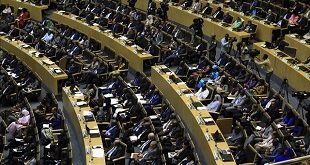
By Julius Businge
The government plans to send you that SMS soon, but is it what you really want?
A few weeks after Maria Kiwanuka read the budget, officials from her Finance ministry and the Uganda Revenue Authority (URA) are showing how transparency and accountability will drive its implementation.
At a meeting with journalists on June 24, Kenneth Mugambe, the commissioner in charge of budget and evaluation in the Ministry of Finance, explained that beyond allocating money to various sectors, the government plans to intensify its accounting for how the money is spent.
“That is why we are coming up with new innovations to involve everyone in the budget process,” he said, “it is you and I paying all this money and so we need to work together to ensure it is spent in a better way.”
Mugambe and officials from URA; John Mayanja, the assistant commissioner at the URA, and Sarah Banage, Paul Kyeyune from URA’s public relations department, met journalists at the Media Centre in Kampala.

Mugambe said the Finance ministry intends to use social media; facebook, twitter, and SMS and the internet to give the public all budget information. Such detailed and open accountability, Mugambe and the URA officials say, is one way of preventing officials from misusing funds allocated to their respective ministries, agencies and other government institutions.
Good move, says Isaac Nkote, a senior economics lecturer at Makerere University Business School (MUBS). He adds the measures could have been prompted by a desire to show the donor community that something is being done to prevent corruption or the misuse of public funds. Corruption and misuse of resources has over the last two years led Uganda’s traditional donors to cut budget support by up to 85%.
In turn, the donor exit forced Kiwanuka to unveil new taxes on various items and transactions to fill the funding gap in the new budget. The government has proposed 15 new taxes including VAT on piped water, Kerosene, wheat, and mobile telephony that net more consumers and have inflamed emotions.
The taxes, in addition to other sources of revenue like borrowing, will hopefully see the country fund the larger part, 81 per cent, of the 2013/14 Shs13 trillion budget.
As the tax burden increases and those caught in the tax net increase, the government must be conscious that the public will demand accountability. The government, therefore, could be attempting to respond to questions before they are asked.
Beyond openness
Indeed Mayanja said URA was “ready to take on any advice on the best way to collect taxes”.
“We are also open to anyone who intends to help us reach out to the community on issues concerning taxation,” he told The Independent on June 28, ““And these innovations are aimed at achieving that.”
Muyanja said citizens should know that it is their responsibility to support URA and the government in the collection and spending of tax money.
But other people, like Nkote, say the government needs to go beyond openness and information sharing.
“People will be happy if their money is actually spent on projects which benefit them,” Nkote says, “What the government needs to do is to go on the ground to ensure that the sent money is well spent on the various projects. If that is not done then these innovations will be useless.
“If it is about medicines in hospitals, let the public find them there,” he says, “If you inform them that we have dispatched the medicines from NMS to their health centre and they do not find it there, then you won’t be doing anything,” he said.
He said the people need specific information that should help them monitor implementation of government projects. For instance if it is a road, he said, they should be told about the cost of the road, timeframe of its completion, the constructor, and performance indicators.
“They can then monitor the actual implementation and report back to the government in case contractors fail to meet their obligation,” he said.
He says providing information and failing to implement the projects will be just another way of “making companies in the communication industry rich”.
“If you send an SMS using a telephone company’s network, let it be of value and then you will earn respect and the public will accept your services since they are the major funders of the budget,” he says.
Slipping performance
Uganda has for a long time been rated highly on budget openness, especially in the amount of budget information the public gets, the extent to which they participate in the budget process, and the ability of parliament and the auditor general to demand accountability.
A 2012 survey by the local NGO, Uganda Debt Network, and the International Budget Partnership (IBP), a US-based independent think tank, ranked it number one in East Africa and 18th most transparent worldwide.
Its point of strength was the baraza’s or accountability platforms, where the public get involved in the budget process.
In recent years, however, corruption, incompetence, poor budget absorption, and persistent requests for supplementary resources by, especially the President’s Office, State House, and departments connected to classified security expenditure, have eroded budget discipline.
Government attempted to put in place strict measures to prevent corruption, after donors cut aid following exposure of the scam in the Office of the Prime Minister. The aim was partly to attract resumption of aid flow to Uganda and to prevent further loss of public funds.
Part of the measures were to block dormant project accounts in the central bank, and closer monitoring of the six big spenders of energy; roads and works, education, health, agriculture, and water.
Further innovations are expected, including plans to overhaul the budget making process. Proposals include a plan to ensure that all proposals and budget allocations are presented to parliament and other relevant government bodies before the budget is read. This move, which is already being done by other countries, has been praised by experts. What the public really want to see, however, is a return to budget discipline and ensuring that budget projects are completed.
 The Independent Uganda: You get the Truth we Pay the Price
The Independent Uganda: You get the Truth we Pay the Price


